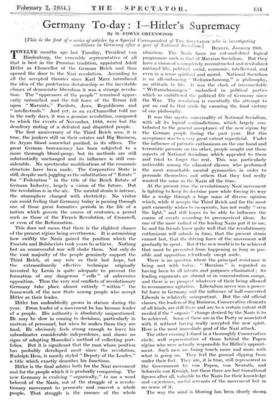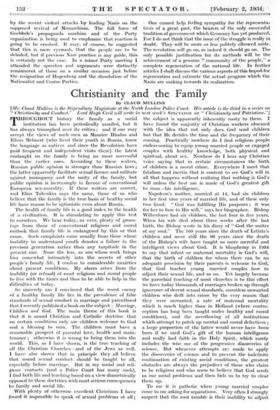- Germany To-day : - 1-41itler's Supremacy
By H. POWYS GREENWOOD
or-respondent of THE SPECTATOR who is intestigating year of National Socialism.] BERLIN, January 28th. • [This is the first of a series of articles by a Special C conditions in Germany after a TWELVE months ago last Tuesday, President von . Hinclenburg, the venerable representative of all that is best in the Prussian tradition, appointed Adolf Hitler as Chancellor of the German Reich and thus opened the door to the Nazi revolution. According to all the accepted theories since Karl Marx introduced the idea of the proletarian dictatorship as the inevitable climax a democratic liberalism it was a strange revolu- tion. The "oppressors of the people" remained appar- ently untouched and the full force of the Terror fell upon "Marxists," Pacifists, Jews, Republicans and "intellectuals." And yet, as an ex-Chancellor told me in the early days, it was a genuine revolution, compared to which the events of November, 1918, were but the desultory rioting of a defeated and dispirited people.
The first anniversary of the Third Reich sees, it is true, the junkers still on their estates and Big Business, its Aryan blood somewhat purified, in its offices. The great German bureaucracy has been subjected to a more thorough blood-purge, but its methods are still substantially unchanged and its influence is still con- siderable. No spectacular modifications of the economic structure have been made. The Corporative State is still, despite such juggling as the substitution of" Estate" for " Federation " in the title of the Reich Estate of German Industry, largely a vision of the future. But the revolution is in the air. The mental strain is intense, the atmosphere charged with electricity. No visitor can avoid feeling that Germany today is passing through one of those great formative periods in the life of a nation which govern the course of centuries, a period such as those of the French Revolution, of Cromwell, or even of the Reformation.
This does not mean that there is the slightest chance of the present regime being overthrown. It is astonishing how swiftly the Nazis gained the position which the Fascists and Bolshevists took years to achieve. Nothing but an unsuccessful war will shake them. Not only do the vast majority of the people genuinely support the Third Reich, at any rate as their last hope, but the extraordinarily effective technique originally invented by Lenin is quite adequate to prevent the formation of any dangerous " cells " of subversive opposition. Thus the very real conflicts of revolutionary Germany take place almost entirely " within " the framework of the new State among people who accept Hitler as their leader.
Hitler has undoubtedly grown in stature during the year. From leader of a movement he has become leader of a people. His authority is absolutely unquestioned.
He may be slow in coming to decisions, particularly in matters of. personnel, but when he makes them they are final. He obviously feels strong enough to leave his subordinates considerable independence, and shows no signs, of adopting Mussolini's method of collecting port- folios, But it is significant that the man whose position has - probably developed most since the revolution, Rudolph Hess, is merely styled "Deputy of the Leader," a title which exactly describes his functions.
• Hitler is the final arbiter both for the Nazi movement and for the people which it is gradually conquering. The new Germany is evolving "organically," to use a word beloved of the Nazis, out of the struggle of a revolu- tionary movement to permeate and convert a whole people. That struggle is the essence of- the whole situation. The Nazis have no cut-and-dried. logical programme such as that. of Marxian Socialism. But they have a vision of a completely reconstructed and revitalized national life, political, social, economic, intellectual, and even in a sense spiritual and moral. National Socialism is an all-embracing "Weltanschauung," a philosophy, an attitude to life. It was the clash of irreconcilable " Weltanschauungen " embodied in political parties which so embittered the political life of Germany since the War. The revolution is essentially the attempt to put an end to that strife by ensuring the final victory of one philosophy. • It was this mystic universality of National Socialism, with all its logical contradictions, which largely con- tributed to the general acceptance of the new regime by the German people during the Past year. But this acceptance was to a very great extent superficial. Under the influence of patriotic enthusiasm on the one hand and terroristic pressure on the other, people sought out those aspects of National Socialism which appealed, to thent • and tried to forget the rest. This was particularly noticeable among the educated classes, who performed the most remarkable mental gymnastics in order to persuade themselves and others that they had really wanted the same as the Nazis all the time.
At the present time the revolutionary Nazi movement is fighting to keep its doctrine pure while forcing its way like a wedge through a huge mass of diverse opinion which, while it accepts the Third Reich and for the most part earnestly wishes to co-operate, has not really "seen the light," and still hopes to be able to influence the course of events according to preconceived ideas. As one of the more radical of the leading Nazis put it to me, he and his friends know quite well that the revolutionary. enthusiasm -will subside in time, that the present strain cannot last, that the driving force of the movement will gradually be spent. But if the new world is to be achieved that must be prevented from happening as -long as pos- sible and opposition relentlessly swept aside.
There is no question where the principal resistance is being met with today. " Marxism " is regarded as having been to all intents and purposes eliminated ; its leading -exponents are abroad or in concentration camps, and there is no prospect whatever of their being allowed to recommence agitation. Liberalism never was a power- ful force in Germany and the influence of half-converted Liberals is relatively unimportant. But the old official classes, the leaders of Big Business, Conservative elements of all kinds, are still there and are to a certain extent still needed if the " organic " change desired by the Nazis is to be achieved. Some of these are in the Party or associated with it without having really accepted -the new spirit. Here is the most immediate goal of the Nazi attack.
The other evening I dined in a thoroughly Conservative circle, well representative of those behind the Papen regime who were actually responsible for Hitler's appoint- ment. Such men are losing touch more and more with what is going on. They feel the ground slipping from under their feet. They are, it is true, still represented in the Government by von Papen, von Neurath, and Schwerin von Krosigk, but these three are but transitional figures after all, valuable to -the Nazis for their knowledge and experience, useful servants - of the movement but in no sense of it.
The way the wind is blowing has been clearly shown by the recent violent attacks by leading Nazis- on the supposed revival of Monarchism. The full force of Goebbels's propaganda machine and of the Party organizatien is being used to emphasize that reaction is going to be crushed. It may, of course, be suggested that this is mere eyewash, that the people are to be deluded, but if previous Nazi practice is any guide, this is certainly not the case. In a minor Party meeting I attended the speeches and arguments were distinctly reminiscent of those on a similar occasion just before the resignation of Hugenberg and the dissolution of the Nationalist and Centre' Parties. - One cannot help feeling sympathy for the_representa- fives of a great past, the bearers of the only successful tradition of government which Germany has yet-produced. For I do not think that the issue of the struggle is really in doubt. They will be more or less -politely elbowed aside. The-revolution will go on, as indeed it should go on. The only possible justification for its methods will be the achievement of a genuine "community of the people," a complete regeneration of the national life. In further articles I shall discuss the various aspects of this hoped-for regeneration and estimate the actual progress- which-the Nazis are making towards its realization.









































 Previous page
Previous page